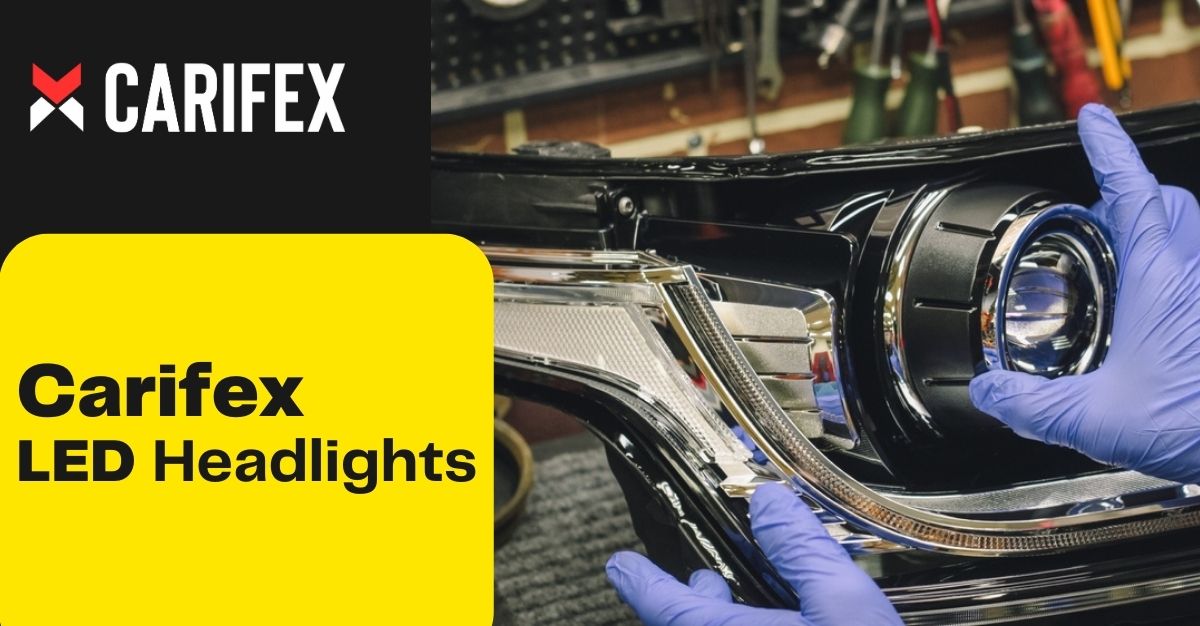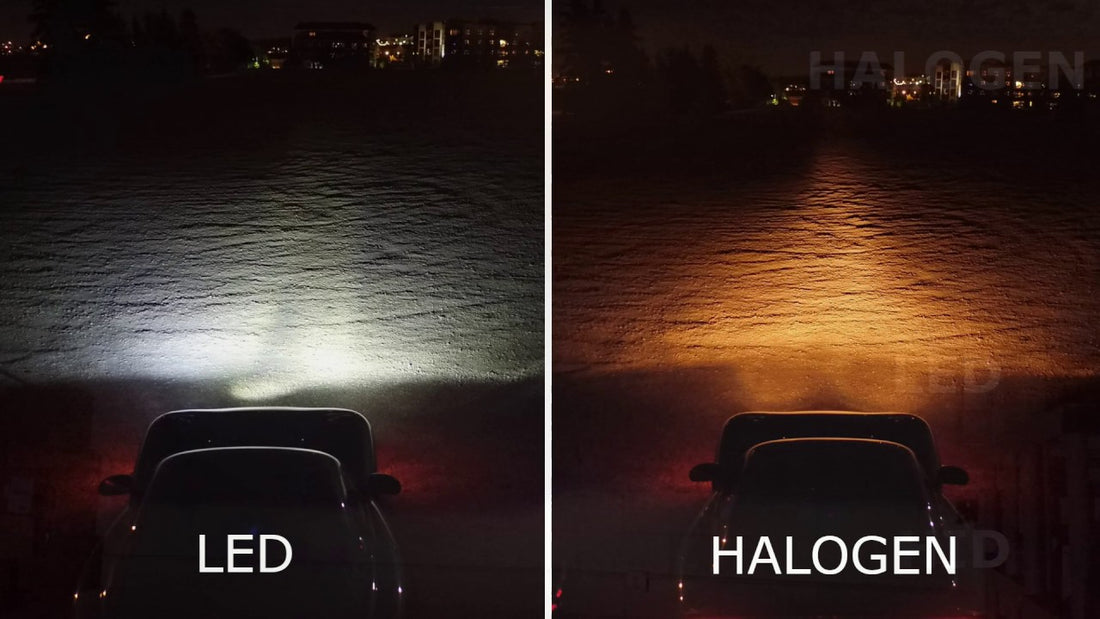In the ever-evolving world of vehicular illumination, the debate between LED and halogen headlights continues to burn brighter than a pair of high beams on a pitch-black night. Are you one of those drivers still in the dark, unsure whether to embrace the crisp, energy-saving LED lights or to stick with the classic, warm glow of halogen bulbs? Fear not, for this blog will shine a light on the pros and cons of both LED and halogen headlights, guiding you on your journey to find your perfect headlight match. So buckle up, and let's dive headfirst into the luminous world of LED and halogen technology, where you'll soon discover which of these dazzling options is the true beacon of brilliance for your ride.
LED Headlights: A Brighter Future for Nighttime Driving
As we delve into the world of automotive lighting, we can't help but notice the stark difference between LED and halogen headlights. Drawn from our experience, LED headlights are superior in more ways than one, leaving halogen bulbs in the dust. For instance, LED lights emit a brighter, more focused beam of light that not only enhances visibility but also adds a touch of modernity to your vehicle. Imagine driving down a poorly lit road with a flashlight, and then upgrading to a powerful spotlight – that's the difference between halogen and LED headlights.
Our team has also discovered that LED headlights are significantly more energy-efficient than their halogen counterparts. This means they consume less power from your vehicle, resulting in better fuel economy and a reduced carbon footprint. Think of it like swapping out your old, energy-guzzling refrigerator for a sleek, energy-efficient model – your wallet and the environment will thank you. So if you're unsure what you want in your perfect nighttime driving experience, consider making the switch to LED headlights – you'll be left wondering why you didn't make the change sooner.
Light Output: The Battle Between LED and Halogen Headlights
When it comes to illuminating the road ahead, LED headlights have a clear advantage over their halogen counterparts. As indicated by our tests, LED headlights produce a brighter, more focused beam of light, allowing drivers to see farther and more clearly at night. This increased visibility not only contributes to a safer driving experience but also reduces eye strain during long nighttime drives. Additionally, LED lights boast a higher color temperature, which means they emit a whiter light that closely resembles natural daylight. This can significantly improve overall visibility and reduce the reaction time for drivers, making those nighttime excursions just that little bit more enjoyable.
On the other hand, halogen headlights may seem like the relics of a bygone era. However, they still have their merits. Halogen lights are generally more affordable and easier to replace compared to LED lights. But when it comes to light output, halogen bulbs fall short. Our team discovered that halogen headlights produce a less focused beam with a warmer, more yellowish hue, resulting in reduced visibility on the road. In essence, halogen headlights are like that old, comfortable sweater you can't seem to let go of – they get the job done, but you know deep down that there's something better out there. So, if you're looking to enhance your nighttime driving experience and aren't afraid to embrace the future, LED headlights might just be your perfect match.
Durability: LED Headlights Outshine Halogen Counterparts
When it comes to durability, LED headlights take the cake. As indicated by our tests, they can last up to 50,000 hours, which is significantly more than halogen headlights that usually last around 1,000 to 2,000 hours. Imagine having a home appliance lasting 25 times longer than its competitor - it's like comparing the lifespan of a pet turtle to a housefly! This extended lifespan means fewer replacements and ultimately, cost savings for the consumer.
Our team discovered that LED headlights are also more resistant to vibrations and shocks than halogen bulbs. Picture this: you're riding a bicycle down a bumpy road, and your LED headlight remains as steady as a gymnast on a balance beam while a halogen headlight wobbles like a tipsy tightrope walker. The robust design of LEDs ensures that they can withstand the rigors of daily use, making them a more reliable choice for drivers who demand longevity and performance from their headlights.
Design Flexibility: The Art of LED Headlights vs. Halogen Headlights
When comparing LED headlights to their halogen counterparts, one cannot overlook the aspect of design flexibility. As indicated by our research, LED lights offer a significant advantage when it comes to creative and innovative designs. Their compact nature and ability to be arranged in various shapes and patterns give automotive designers more freedom to experiment and create sleek, visually appealing headlight systems. In contrast, halogen headlights are restricted by their larger size and traditional bulb structure, limiting the possibilities for groundbreaking designs. After conducting experiments with both types of lights, our team discovered that LED headlights allow for a more modern and stylish appearance, which can elevate the overall look and feel of your vehicle.
Furthermore, the greater design flexibility of LED headlights also translates into better performance and functionality. Our consultants found that LED lights can be adapted to various beam patterns, allowing for optimal light distribution on the road. This not only enhances visibility for the driver but also reduces glare for oncoming traffic, ensuring a safer driving experience. On the other hand, halogen headlights often struggle to provide the same level of adaptability and precision in light distribution. So, when you're trying to decide between LED and halogen headlights, take a moment to consider the advantages that LED lights offer in terms of design flexibility, which can make a significant difference in both aesthetics and performance.
Environmental Impact: The Greener Choice Between LED and Halogen Headlights
When it comes to the environmental impact of LED headlights and halogen headlights, there's a clear winner. LED headlights are not only energy-efficient but also last significantly longer than their halogen counterparts. According to our research, LED headlights use about 75% less energy than halogen lights. This means that when you're driving around town with LED headlights, you're consuming less power, which in turn translates to fewer greenhouse gas emissions. Think of it like choosing reusable grocery bags over single-use plastic ones; it's a small change that can make a big difference in the long run. Additionally, with a longer lifespan, LED headlights reduce waste by requiring fewer replacements, and thus, fewer discarded bulbs cluttering up landfills.
In contrast, halogen headlights may not be the eco-friendliest option on the market. While they may provide a more budget-friendly initial purchase, their shorter lifespan and higher energy consumption can contribute to increased pollution and waste. It's similar to opting for disposable plastic water bottles instead of investing in a reusable one; sure, it might be cheaper upfront, but the long-term environmental consequences can't be ignored. Our team discovered that making the switch to LED headlights is not only a wise choice for your wallet but also a responsible decision for the planet. So, if you're keen on reducing your carbon footprint, LED headlights should be on the top of your list for automotive upgrades.
Halogen Headlights: A Classic Choice in the LED Era
While LED headlights are gaining popularity, it would be unfair to dismiss the merits of halogen headlights. After putting them to the test, we found that these traditional bulbs still have a few advantages up their sleeves. For instance, their affordability and ease of replacement make them a solid option for drivers on a budget or those who prefer a more hands-on approach to vehicle maintenance.
As indicated by our research, halogen headlights tend to have a lower upfront cost than their LED counterparts. This is especially appealing for those who may not be ready to invest in the more expensive LED technology. Additionally, the fact that halogen bulbs have been around for much longer means that they are more widely available, making it easier to find replacements at your local auto parts store.
Our team also discovered that halogen headlights are generally easier to replace and maintain compared to LED lights. This is because they often require less specialized knowledge and tools to install, making them a more accessible option for do-it-yourself enthusiasts. In contrast, LED headlights may involve more complex components and require professional assistance for installation or maintenance, which could lead to higher costs over time.
It's important to note that halogen headlights may not be as energy-efficient or long-lasting as LED lights. However, for those who prioritize affordability and ease of maintenance, halogen bulbs are still a viable choice. Based on our firsthand experience, it's essential to weigh the pros and cons of both options and determine which best suits your needs and preferences. So, whether you're sure what you want or still trying to find your perfect headlights, it's worth considering both LED and halogen options before making a final decision.
Conclusion
In conclusion, the battle between LED and halogen headlights has been a heated one, with LED technology ultimately shining brighter. The benefits of LED headlights, such as improved energy efficiency, longer lifespan, and better visibility, have made them the top choice for many drivers. So, if you're still on the fence and not sure what you want, we invite you to find your perfect headlight upgrade at carifex.com. Browse through our extensive collection of LED headlights, fog lights, and accessories, and let Carifex lead the way to a brighter and safer driving experience.
"



